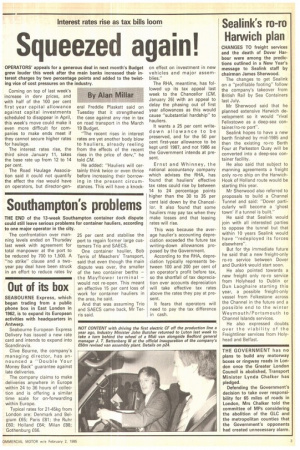Squeezed again!
Page 5

If you've noticed an error in this article please click here to report it so we can fix it.
By Alan Millar
OPERATORS' appeals for a generous deal in next month's Budget grew louder this week after the main banks increased their interest charges by two percentage points and added to the twisting vice of cost pressures on the industry.
Coming on top of last week's increase in dery prices, and with half of the 100 per cent first year capital allowance against capital investments scheduled to disappear in April, this week's move could make it even more difficult for companies to make ends meet if they cannot secure higher rates for haulage.
The interest rates rise, the third since January 11, takes the base rate up from 12 to 14 per cent.
The Road Haulage Association said it could not quantify the effect the rise would have on operators, but director-gen eral Freddie Plaskett said on Tuesday that it strengthened the case against any rise in tax on road transport in the March 19 Budget.
"The recent rises in interest rates are yet another body blow to hauliers, already reeling from the effects of the recent rises in the price of derv," he told CM.
He added: "Hauliers will certainly think twice or even thrice before increasing their borrowing in the present circumstances. This will have a knock on effect on investment in new vehicles and major assemblies."
The RHA, meantime, has followed up its tax appeal last week to the Chancellor (CM, January 26) with an appeal to delay the phasing out of first year allowances as this would cause "substantial hardship" to hauliers.
It wants a 25 per cent writedown allowance to be preserved, and for the 50 per cent first-year allowance to be kept until 1987, and not 1986 as the Government intends at present.
Ernst and Whinney, the national accountancy company which advises the RHA, has found that hauliers' effective tax rates could rise by between 14 to 24 percentage points higher than the 30 to 35 per cent laid down by the Chancellor. It also found that some hauliers may pay tax when they make losses and that leasing rates will rise.
This was because the average haulier's accounting depreciation exceeded the future tax writing-down allowances proposed by the Government.
According to the RHA, depreciation typically represents between 100 and 200 per cent of an operator's profit before tax, so the shortfall of tax depreciation over accounts depreciation will take effective tax rates above the rates they pay at present.
It fears that operators will need to pay the tax difference in cash.




































































































